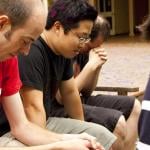PROVERBS 30:18-20
Yahweh is a God of wonders. The first “wonderful thing” ( pala’ , which basically means “to separate” or “distinguish”) that He does in Scripture is to give Sarah a son in her old age, a live son from a dead womb, the wonder of resurrection life (Genesis 18:14). He does wonders again in stretching out His hand to smite Egypt (Exodus 3:20). The wonder here is not only the terrible wonder of plagues and judgments on Egypt (cf. Deuteronomy 28:59), but the wonder of raising up dead Israel to new life. During the covenant-renewal after the golden calf incident, Yahweh promises to make a covenant and “do wonders which have not been produced in all the earth” (Exodus 34:10). This is followed by a promise that the Lord will drive the Canaanites from the land. The wonder is the wonder of conquest, and the fact that Yahweh has entered into covenant, and remained in covenant with a people that turns harlot to pursue other gods (cf, Joshua 3:5). God’s works in creation and history are all wonderful, according to the Psalms. “Wondrous works” appears again and again (9:1; 26:7; 31:21; 40:5; 71:17; 72:17; 75:1; 78:4, 11, 32; 86:10; 96:3; 98:1; 107:8, 15, 21, 24, 31).
Agur highlights a several of the wonders of creation in this short poem. He confesses once again his own ignorance (cf. 30:2), professing to know nothing of the wonders of the creation. The three-four pattern of this list is significant. Three is the number of the levels of creation in the original creation narrative, and the first three of these wonders correspond to the three zones of creation. The eagle flies in the heavens, the serpent slithers on the rock, the ship tosses in the sea. Yet, the list expands out to a fourth item, and that number four suggests that the wonders fill the world to the four corners. Wonders are everywhere we look: Heaven, earth, and sea; north, south, east, west. The “three, yea four” suggests a creation motif in a different way: Three and four makes seven, an allusion to the days of the creation week. Not only all space, but all time is filled with wonders.
In another sense, the list divides into pairs. The first two speak of animals in a natural environment, while the last two introduce human beings, their technical prowess (ship) and their romantic skill (man with maid). Post-romantics that we are, we are in awe of the sublime vistas of creation. So is Agur, but Agur is also awed by human achievements, which are part of the world of three, four, and seven, as much as eagles and snakes.
What leaves Agur awed in each case is the “way” of some created thing. The Hebrew word is used literally for a “path” or a “road,” but in the Proverbs it is typically used metaphorically to describe a “way” of life, a path or road that a person travels. In the first three items in this list, the “way” seems to imply a way of movement, eagles gliding, snakes slithering, ships cutting the waves. In the fourth item of the list, the way is a manner of behavior. In each case, the use of “way” suggests a movement toward a destination or a certain actions that are directed toward a goal. Though verse 20 stands outside the list, it is connected to it by the repetition of the word “way.” The “way” of the adulterous woman is somehow being connected to the ways of eagles, serpents, ships, and lovers. Though verse 20 stands outside the list, the manner of the adulterous woman still fills Agur with wonder, though presumably of a different sort. We’ll return to the role of verse 20 later.
The Hebrew word for “eagle” ( nesher ) covers a larger group of birds than our English word. Sometimes, the word refers to bald birds (Micah 1:16) that eat dead bodies (Job 39:27). Yahweh Himself is like an eagle, bearing Israel up out of Egypt into the wilderness (Exodus 19:4; cf. Revelation 12:14) and who hovers over Israel like an eagle, and like the fluttering spirit over the waters of creation (Deuteronomy 32:11). He is like an eagle because he masters the clouds and sky, because He mounts to heaven and rides the wings of the wind. Cherubim have eagle faces (Ezekiel 1:10; 10:14). Empires swoop down on Israel like eagles (Ezekiel 17:3, 7), and the great warriors Saul and Jonathan were like eagles on the battlefield (2 Samuel 1:23). The Lord promises to make His people soar like eagles, like mighty stars in the heavens. For Agur, the way of an eagle in the sky is a wonder; his speed, ease, grace is awesome, and a pointed to the awesome God who is like an eagle.
Serpents are more prominent in Scripture than eagles. Serpents bite and poison, protecting themselves with their mouths. Serpents are also described several times as eating dust. It was a serpent ( nachash ) that tempted Eve, and was a creature that the Bible describes as more “subtle” or crafty than any other creature (3:1). The same word for “crafty” is used to describe the “prudence” of the wise man throughout the Proverbs (12:16, 23; 13:16; 14:8, 15, 18; 22:3; 27:12). In many of these verses, the prudent proves himself wise precisely by recognizing the “way” ahead, by noticing what is happening and taking steps to avoid evil or to pursue. The way of a serpent on a rock is a sign of this subtlety. The snake has no legs, and yet it can cross surfaces at a rapid clip. It is crafty enough to see dangers ahead and slip to the side. It can slide into the smallest cleft in the rock to find safety. Serpents are often slender and look fragile; but they are deadly and know how to protect themselves.
As noted above, with the third in the series, we move from nature to human culture and technology. The sea was viewed as a dangerous and chaotic place in the ancient world; it is the chaos of the sea from which the creation was formed. The heart of the sea is the place where the land and its cities are in danger of falling (Psalm 46:2). Yahweh shows His power at the Red Sea by making the deeps “congeal” in the heart of the sea. Mastery of the sea was thus seen as the height of human ingenuity and power. Taking a bit of land/wood across the sea was a godlike activity, like walking on the water or like flying through the heavens. Agur’s ship is in the “heart of the sea,” apparently far from land. The ship can be navigated only by reference to stars, another sign of the power of human knowledge.
Four ways are listed in verse 19, and the ways are parallel, coming to a climax in the way of a man with a maid. The Hebrew terms are more specific. The man is a “ geber ,” a mighty-man, a warrior; the main is an ‘ almah , a maiden, a virgin. This is not, however, a rape scene, but a seduction scene. Taken literally, Agur has identified one of the great wonders of the world, a wonder that has taxed the insight of poets, playwrights, and philosophers since the beginning of time. What accounts for the attraction of a man to a maid, or vice versa? How does one fall in love? What accounts for the power of love, which the Song of Songs describes as being “as strong as death”? There are mysteries here, and Agur is right to stand back and admire the power of love. Pheromones don’t explain it. It’s a wonder. And it’s a wonder analogous to the other wonders. A man seducing a maid is as spectacular as an eagle navigating through the air, as elusive as a snake on the rock, as great a human achievement as the navigation of the seas.
Verse 20 gives us the obverse “wonder” to the last clause of verse 19. If the power of love and sexual attraction is a wonder, the way of an adulterous woman is also a wonder. She “eats,” that is, she consumes her man (as Lady Folly
does at the beginning of the book). She becomes “one flesh” with a man. That’s perhaps a wonder in itself: If the power of attraction is so powerful, what of the power of illicit attraction? People risk everything, literally everything, for a few hours of illicit sexual pleasure. What astonishes Agur here, though, is the fact that the adulterous can eat her fill, wipe her mouth, and then act as if she has done nothing. Her lack of guilt or regret is the great wonder of this verse.
PROVERBS 30:21-23
We have another “three, nay four” structure here, and the numerology of the previous list applies here as well. We are again in the world of heaven, earth, sea; the world of north, south, east, and west; the world of the seven days. Here, Agur’s focus is particularly on the earth and the things that make it quake and collapse. The human world isn’t permanent. God shakes the world, and certain kinds of events in the world shake and stir it, causing its pillars to fall.
At the literal level, each case that Agur lists is about the elevation or satisfaction of someone who is low or empty. When a slave who has no training for kingship becomes king, he is liable to abuse his power to get what he wants and to grasp all the things denied him as a slave. He has no sense of restraint. Revolutionary movements throughout history illustrate the point, since they commonly overthrow tyrants and replace them with more tyrannous regimes. Fools who don’t observe any moderation are intolerable when filled with food. The drunk at the party is a fool who shakes the earth when he satisfies his god, his belly.
An unloved woman craves affection and attention, and when she finally secures a husband, she can’t get enough. She shakes the earth of the home with her continual demands for more attention and more love. She is another “leech” who can never say enough (cf. vv 15-16). This is an exhortation to love daughters; loved daughters make suitable and stable wives, while unloved daughters shake the world until it topples. Alternately, Agur may be pointing to the pride and haughtiness of a woman who has finally gotten her husband. A maidservant who supplants her mistress is like the slave who becomes king. She is unprepared for the responsibilities.
The list perhaps has a chiastic structure. The first and fourth items in the list are obviously similar: The slave and the maidservant match, and in each case they rise to a level they are unprepared to handle. The second and third quaking things are not so obviously linked, but if we remember (cf. v. 20) that eating and sex are parallel in Scripture, we can see the connection. A fool is unbearable when satisfied with food; an unloved woman is unbearable when she finally gets her fill of sex.
Though the surface meaning is fairly clear, it is striking how each of these is inverted by the gospel. Jesus takes the form of a slave to become a king; the foolish and despised of the world are filled at the Lord’s table; unloved and rejected Israel receives a husband; and the maidservant church takes the place of mistress Israel in the affections of her Lord. As Agur predicts, these things shake the world and turn it upside down. They crack it wide open. But maybe cracking the world wide open is not always a bad thing.















